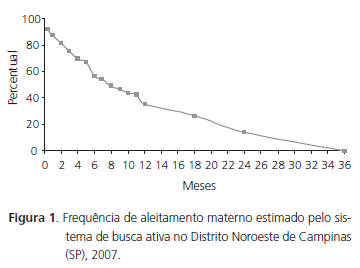OBJECTIVE: This study describes the breastfeeding practices of vulnerable groups living in an area covered by the Northwest Health District of Campinas (SP), Brazil. METHODS: A cross-sectional study was done by visiting all families in the studied area and performing a census-like survey called active search. An exploratory study was done of the breastfeeding practices of a socially vulnerable population living in the outskirts of Campinas. This area has approximately 165,000 inhabitants and three primary healthcare facilities. RESULTS: The survey found 1,139 children under six years of age and 72.6% of the families were below the poverty line; 93.3% of the children were breastfeed for a median of 8 months (CI 95% 7.0 - 8.9 months); exclusive breastfeeding lasts a median of 4 months (CI 95% 3.9 - 4.1 months), and more than 20% of the children were given other foods during their first month of life. Most of the families reported that the primary healthcare facilities gave them no information on breastfeeding. CONCLUSION: Breastfeeding and exclusive breastfeeding in the studied area found by active search lasted longer than the national average and longer than those of families with similar socioeconomic characteristics. This reinforces the importance of primary healthcare incorporating this strategy in actions that promote breastfeeding.
Breast feeding; Infant; Health services





